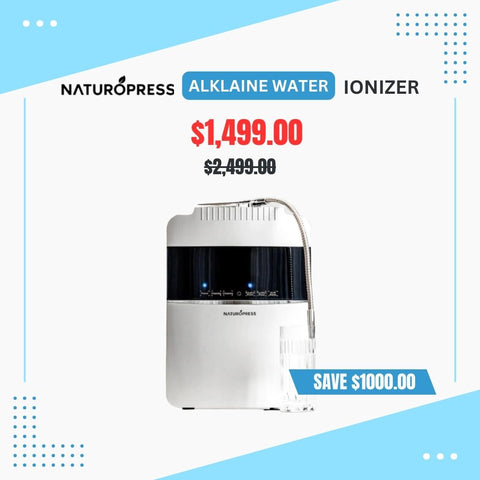Plants can't grow without water, but have you thought about the type and quality of water you give your house plants? Explore the world of alkaline water for plants, learn about its benefits, and find out how to make your houseplants grow and thrive. Let's get started!
What is the Definition of Alkaline Water?
Alkaline water is water that has a pH higher than 7.0, making it less acidic. This type of water often comes from natural springs or can be created using a water ionizer machine. When water is alkaline, it typically contains beneficial minerals like magnesium that may benefit plant growth. You can delve deeper into the anti-aging benefits of alkaline water to understand its other advantages for human consumption.
Why is pH Level Important for Plants?

The pH level of water determines its acidity or alkalinity. It's essential to keep a pH balance in the body for better health, and similarly, this balance is crucial for plants as it affects the absorption of nutrients from the soil. While many plants prefer a slightly acidic soil with a pH range that's less than 7.0, others thrive in alkaline or slightly acidic water conditions. Therefore, understanding the pH level of your water can be essential to ensuring optimal plant growth.
Is Tap Water Good for Plants?
Using municipal water or regular tap water for your plants can be a hit or miss. Some tap water contains chemical compounds that are either acidic or alkaline, which can affect your soil's pH. Also, hard water, which has high mineral content, might cause accumulation and harm plants in the long run. Hence, always testing a water sample before using it for plants is recommended.
What Effects do High pH Levels Have on Plants?
High pH levels can make water more alkaline. While some plants thrive in alkaline water, others might suffer. Acid-loving plants, for instance, prefer acidic soil and can show signs of nutrient deficiency when watered with high alkaline content.
How Does Alkaline Water Affect Plant Growth?
Alkaline water can also help in improving the growth of plants, especially those that prefer alkaline conditions. This type of water helps in the better absorption of nutrients and can be beneficial for plants that thrive in alkaline soil. However, always remember to monitor the soil’s pH to ensure it's not becoming too alkaline for your specific plant species.
Which Plants Like Alkaline Water?
Interestingly, some plants prefer alkaline water. For instance, some house plants and certain types of outdoor flora might show enhanced growth when watered with alkaline water. Always research specific plant preferences before switching your water source. If you're wondering about other uses, you can also explore how alkaline water affects hair growth.
How Can You Make Alkaline Water at Home?
To make alkaline water at home, one can use a water ionizer. In fact, the Naturopress Alkaline Water Ionizer is a great tool for this purpose. Alternatively, adding baking soda can also raise the water's pH. However, always test the pH level of your water after making adjustments to ensure it’s suitable for your plants.
Distilled Water vs. Alkaline Water: Which is Better?
There's an ongoing debate about distilled water vs. alkaline water. While distilled water doesn’t contain minerals and has a neutral pH, it might not be as nourishing for plants as alkaline water. Alkaline water contains essential minerals which can be beneficial for plants. However, using a mixture of distilled and alkaline water, processed using a multifunctional water ionizer, could be a balanced approach.
Can Too Much Alkaline Water Harm Plants?

Yes, just like how too much of anything isn't good, the same applies to using excessive alkaline water for plants. Plants that grow in highly alkaline water may show stunted growth or even yellowing of leaves, especially if they prefer a slightly acidic environment.
Benefits of Alkaline Water for Indoor and Outdoor Plants.
Alkaline water, when used rightly, can offer several benefits. From aiding the absorption of nutrients to providing essential minerals, the benefits of alkaline water for plants are noteworthy. For plants that prefer slightly alkaline conditions, this type of water can even boost their overall health and growth.
Key Takeaways:
- Alkaline water is water with a pH higher than 7.0 and can be beneficial for certain plants.
- The pH level of water affects nutrient absorption and thus impacts plant growth.
- Not all plants benefit from alkaline water; it's crucial to know your plant's preference.
- You can make alkaline water at home using an ionizer or natural ingredients.
- Balancing between distilled and alkaline water might be the key to plant health.
FAQ: Alkaline Water for Plants
- Can I use tap water for my indoor plants after reading about alkaline water benefits? While tap water is commonly used for watering house plants, its quality and pH level can vary. Alkaline water, especially one that hydrates better, is considered beneficial due to its high pH. But using filtered tap water might also be suitable, especially if the tap water in your area is not too acidic or alkaline. Always check the water pH and ensure it's around the neutral range (7.0) for most plants.
- Does water quality really make a significant difference in plant growth? Yes, water quality plays a pivotal role in plant growth. Water that contains chemical compounds, either acidic or alkaline, can influence the soil's pH. This, in turn, affects the plant's ability to absorb nutrients. Using alkaline water for plants can definitely help your plants grow healthily.
- How can I test the pH level of my water at home? There are pH testing kits available at gardening or home improvement stores. These kits can give you a clear reading of your water pH, helping you determine if it's neutral, acidic, or alkaline.
- My water filter produces ionized water. Is that good for my plants? Ionized water, or alkaline water, has a higher pH compared to regular tap water. While many plants thrive with a pH close to neutral (7.0), some plants prefer slightly acidic or alkaline conditions. Before using ionized water, it's best to determine the pH preferences of your plants.
- Are there specific types of plants that grow best in alkaline water? Yes, there are certain plants that thrive in alkaline conditions. Plants that naturally grow in regions with high pH soil might benefit from alkaline water. However, most indoor and outdoor plants prefer a slightly acidic to neutral pH.
- I heard acidic water with a pH below 7.0 is not good for plants. Is that true? Not necessarily. While many plants prefer neutral water, there are acid-loving plants that thrive in slightly acidic conditions. Always check the specific pH requirements of the plants you are growing, and understand the benefits of acidic water use.
- Can the effects of high pH water be neutralized for plants that prefer acidic conditions? Yes. If you've been using water with a high pH and want to switch to more acidic conditions, you can gradually introduce acidic water or use water that's been treated with pH-lowering compounds. It's essential, however, to make changes gradually to avoid shocking the plants. For more understanding on the topic, read about the benefits of alkaline water.
- Is there a difference in how I should water indoor vs. outdoor plants using alkaline water? Both indoor and outdoor plants have varying needs based on their species and environment. While the principles remain the same - understanding the plant's pH preference and ensuring consistent water quality - outdoor plants might require adjustments based on rainfall and soil type.
- Do I need to water plants more frequently with alkaline water? The frequency of watering does not change based on the water's pH. However, always ensure that the water quality remains consistent and suitable for the plants you are growing. If you're considering using alkaline water for other purposes, explore our post on alkaline water for hair and skin benefits.
- Can I mix regular tap water with alkaline water to give my plants a pH balance? Yes, you can mix tap water with alkaline water to achieve a desired pH level. It's a good idea to test the resulting pH of the mixture before using it to water your plants. Curious about the differences between different types of water? Check out our post comparing alkaline vs. spring water.



